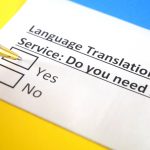
6 Tips for Legal Documents Translation
If you have a document that you need to get translated, then you need to make sure that you do it accurately. There are a lot of different types of translation that might need to take place in a variety of industries. Conversational translation and interpretation are not the same things as document translation. If you have a legal document, then the stakes are high. You need to make sure that this document is translated perfectly. That is where qualified legal translators can be helpful. Learn more about how you can find the right legal translation team to meet your needs.
The Importance of Qualified Legal Translation
If you have legal documents that you need to get translated, you need to make sure that this is done accurately. When you go to court, you are not going to get a second chance to undo things purely because the translation was inaccurate. Therefore, you need to make sure that you get this right the first time. Some of the areas where you might need to get documents translated include:
- There is a divorce taking place and assets need to be divided appropriately.
- There are issues related to child custody and the parties are having trouble understanding the documents
- There’s an issue related to international laws and taxes that has to be resolved
- There’s a criminal case taking place and the defendant may not be able to understand the nature of the charges against him or her
- There is a civil lawsuit unfolding and one party is not able to accurately understand the issues
Importantly, these are just a few of the many examples of legal translation examples that might be required. Some people might be thinking about simply using the internet to handle their translation services; however, this is not going to be able to interpret slang, jargon, and advanced legal terms. Instead, it is critical to rely on professionals who have the experience and training to make sure these documents are translated appropriately. If you do not hire qualified translators to handle the translation of these documents, you are not going to be able to place your client in the position to be successful. When you are trying to translate these documents, there are a few important tips that you should keep in mind.

6 Tips for Legal Document Translation
When you decide to partner with translators, you are going to work with him or her as a team. Therefore, you need to make sure that you clearly communicate and place your translator in a position to be successful. When you provide your translator with the information that he or she needs, you increase the chances of your documents coming back in a manner that is appropriate for you. Some of the tips that you need to follow when you are getting these documents translated include:
- Clarify: Make sure that you clearly explain which documents you need to have translated. In a lot of situations, you are going to send over a large package of documents. On the other hand, you may not need all of them translated. Therefore, you need to work with the translator and clearly explain what you need to be translated. For example, there might be notes that have been handwritten in the margin that you need a translator. This is an area that your translator might have otherwise overlooked. Or there might be a cover page or an address page that you do not need to have translated. Clearly specify what documents need to be translated.
- Explain How the Document Is Going to Be Used: In the vast majority of industries, context is important. In order for your translator to provide you with an accurate document, you need to clearly explain how the document is going to be used. For example, you might be sending the document to someone else after you have a translator. Or you might be submitting this document as evidence in court. Regardless, you need to make sure that your translator understands how the documents going to be used. This is going to impact the manner in which he or she translates it. Context matters when it comes to translation.
- Specify a Glossary of Legal Terms You Need: In some situations, you may have options when it comes to the language in which you translate. You want to work with your translator to specify a glossary of key terms that you are going to use. For example, one word and one language translate three or four different ways in another language. Which translation are you going to use? Your translator might be able to help you figure out the language that you should use when it comes to the translation. You need to make sure that you specify this at the beginning of the translation process. That way, you can reduce the chances of serious errors being made.
- Specify the Dialect that You Need: Many languages have multiple dialects. You need to make sure that you specify the dialect that you need. For example, if you are translating something turn English into Mandarin, you need to make sure that you specify that Mandarin is actually what you need. Cantonese, Shanghainese, and Fujianese are all slightly different dialects and cannot be easily understood by someone speaking a different dialect. The consequences of choosing the wrong dialect can be severe. Therefore, work with your translator and make sure that you find the right dialect.
- Think About the Legal Process: Another important piece of contact that you need to provide your translator involves the legal system. Even though it is easy to overlook the legal system of the target language, it is a critical aspect of document translation. If the documents in question relate to a very complicated litigation process that is unfolding, the consequences of a slightly inaccurate translation can be magnified. There are culturally dependent concepts that have to be reflected in the document that you were having translated. Work with your translator to make sure that you hit this goal.
- Do Not Forget About the Formatting: When you are submitting something to a court of law, you need to make sure that the document is as convenient as possible for the people reading it. Therefore, you need to think about formatting as well. What font do you want to use? Are there any graphics are tables that have to be included? How big should the font be? All of this is going to reflect your professionalism. Therefore, take the time to get the formatting right as well.
These are just a few of the most important tips that you should keep in mind if you are getting these documents translated. Remember that when you are getting something translated for legal purposes, the stakes are high. Therefore, you need to make sure that you find the right legal translation service to place you in a position to be successful. When you use these tips as the foundation of your strategy, you increase the chances of having documents returned quickly, accurately, and successfully.
More...
Categorised in: Language Services





